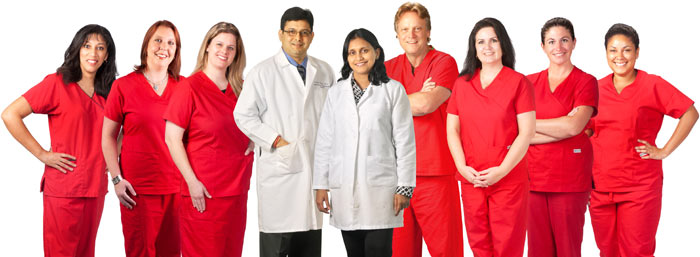The doctors at Marion Heart Associates, P.A. clarify the difference between varicose veins and a more serious condition known as deep vein thrombosis.

L to R: Noemi Torres, CVT; Nichole Pacifico, MA; Jennifer Bedi, RN; Prem Singh, MD, FACC, FSCAI; Kriti Kumari, MD; Clifford Burke, CVT; Paula Cassella, MA; Joanne Storke and Eva Disla
What is the difference between an artery and a vein?
With each beat of your heat, arteries carry rich oxygenated blood to different parts of your body, including your legs. Veins carry the deoxygenated blood away from the legs back up to the lungs to pick up more oxygen and then on to the heart.
What is the difference between spider veins, varicose veins and deep vein thrombosis?
Varicose veins and spider veins are a condition associated with the superficial venous system. They are the visible surface manifestations of an underlying problem with reverse venous flow. This means venous blood is deviating from a normal flow path to flow in a retrograde direction so that fluid accumulates, causing a “congested” leg and venous claudication. Deep vein thrombosis (DVT) is the formation of a blood clot in a deep vein.
What are the symptoms of each?
In many people, varicose veins cause no symptoms other than the appearance of the bulging, twisted vein beneath the skin. Varicose veins are often progressive, which means that symptoms may worsen over time. In some people, symptoms include aches, swelling of feet and ankles, itching, cramping or restless legs and overall leg tiredness or heaviness. Symptoms of DVT include sudden pain, redness, warmth and swelling in the affected leg.
Is one condition more dangerous than the other?
DVT is a serious condition that can be life threatening. Immediate treatment is required involving hospitalization, blood thinning and medications, as these clots can break off and travel to the lungs. Untreated varicose veins eventually produce chronic skin and soft tissue changes that begin with mild swelling and then progress to discoloration, inflammatory dermatitis, recurrent or chronic cellulitis, cutaneous infarction, ulceration and even malignant degeneration.
What are the risk factors for developing a vein condition?
Risk factors for varicose veins include:
1. Heredity.
2. Gender. Women are at greater risk than men.
3. Pregnancy. Varicose veins may surface for the first time or worsen during late pregnancy when the uterus exerts greater pressure on venous system.
4. Obesity. Excess weight puts pressure on surface veins, causing them to weaken.
5. Standing and sitting. People who have jobs that require them to stand or sit for long periods also are at increased risk.
Important risk factors for DVT include:
1. Immobility. Prolonged travel and sitting, airplane flights, long drive, surgery and trauma.
2. Hypercoagulability. Coagulation of blood faster than usual.
3. Trauma to the vein.
What types of procedures are available?
Mild varicose veins often do not require treatment; however, some people may choose treatment for cosmetic reasons or because the condition causes uncomfortable symptoms.
Treatments for varicose veins include compression stockings, injection therapy, surgery, laser therapy, closure technique or treatment of ulcers.
What can one do to prevent vein issues in the future?
Not all varicose and spider veins can be prevented. Regular exercise, weight control, leg elevation when resting and wearing elastic support stockings can reduce your chances of getting new varicose and spider veins.
Marion Heart Associates has been a top practice in Ocala for over 20 years. The facility is comprised of primary care physicians, cardiologists, interventional cardiologists, as well as specialists in endocrinology and geriatrics. They provide one-stop shopping for all your medical care needs. The Board Certified expert physicians at Vein Clinic at Marion Heart Associates provide a wide range of treatment for vein problems.
Marion Heart Associates, P.A.
Main Office
1805 SE Lake Weir Avenue, Ocala
(352) 867-9600
Summerfield Office
10369 SE 175th Pl. Rd., Ste. 200, Summerfield
TimberRidge Office
9410 SW Hwy 200, Ste. 403, Ocala
marionheartassociates.com provides plenty of information about the various medical conditions treated at the facility.






